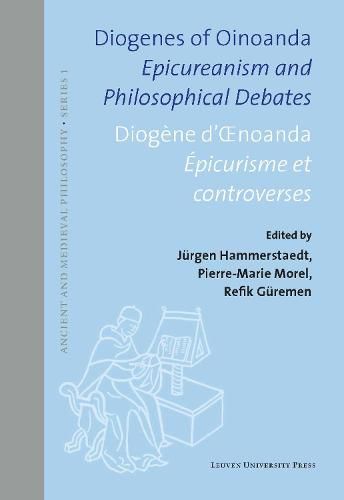Readings Newsletter
Become a Readings Member to make your shopping experience even easier.
Sign in or sign up for free!
You’re not far away from qualifying for FREE standard shipping within Australia
You’ve qualified for FREE standard shipping within Australia
The cart is loading…






This title is printed to order. This book may have been self-published. If so, we cannot guarantee the quality of the content. In the main most books will have gone through the editing process however some may not. We therefore suggest that you be aware of this before ordering this book. If in doubt check either the author or publisher’s details as we are unable to accept any returns unless they are faulty. Please contact us if you have any questions.
The texts of Diogenes of Oinoanda (2nd century AD) who invited his readers to an Epicurean life is the largest ancient inscription ever discovered. Over 70 new finds have increased the number of known wall blocks and fragments to nearly 300, offering new insights into Diogenes’ distinctive presentation of philosophy. This collection of essays discusses the philosophical significance of these discoveries and is the first of this kind entirely devoted to Diogenes of Oinoanda. Particular attention is paid to his philosophical aims and polemical strategies. Diogenes was apparently well aware of still ongoing philosophical debates, engaging in polemics against Presocratic philosophers, Platonics, and especially Stoics. His views about important issues like happiness, fear, old age, and the afterlife are explained on the bases of Epicurean physics and theology, ethics, politics, theory of knowledge, and psychology.Contributors Martin Bachmann (The German Archaeological Institute), Michael Erler (University of Wurzburg), Alain Gigandet (University Paris - Est Creteil), Jean-Baptiste Gourinat (Centre National de la Recherche Scientifique/University of Paris - Sorbonne/Ecole Normale Superieure), Refik Guremen (Mimar Sinan University), Jurgen Hammerstaedt (University of Cologne), Giuliana Leone (University of Naples Federico II), Francesca Masi (University Ca’ Foscari of Venice), Pierre-Marie Morel (University of Paris 1 - Pantheon Sorbonne / Institut Universitaire de France), Geert Roskam (KU Leuven), Martin Ferguson Smith (Durham University), Voula Tsouna (University of California), Francesco Verde (La Sapienza University of Rome)
$9.00 standard shipping within Australia
FREE standard shipping within Australia for orders over $100.00
Express & International shipping calculated at checkout
This title is printed to order. This book may have been self-published. If so, we cannot guarantee the quality of the content. In the main most books will have gone through the editing process however some may not. We therefore suggest that you be aware of this before ordering this book. If in doubt check either the author or publisher’s details as we are unable to accept any returns unless they are faulty. Please contact us if you have any questions.
The texts of Diogenes of Oinoanda (2nd century AD) who invited his readers to an Epicurean life is the largest ancient inscription ever discovered. Over 70 new finds have increased the number of known wall blocks and fragments to nearly 300, offering new insights into Diogenes’ distinctive presentation of philosophy. This collection of essays discusses the philosophical significance of these discoveries and is the first of this kind entirely devoted to Diogenes of Oinoanda. Particular attention is paid to his philosophical aims and polemical strategies. Diogenes was apparently well aware of still ongoing philosophical debates, engaging in polemics against Presocratic philosophers, Platonics, and especially Stoics. His views about important issues like happiness, fear, old age, and the afterlife are explained on the bases of Epicurean physics and theology, ethics, politics, theory of knowledge, and psychology.Contributors Martin Bachmann (The German Archaeological Institute), Michael Erler (University of Wurzburg), Alain Gigandet (University Paris - Est Creteil), Jean-Baptiste Gourinat (Centre National de la Recherche Scientifique/University of Paris - Sorbonne/Ecole Normale Superieure), Refik Guremen (Mimar Sinan University), Jurgen Hammerstaedt (University of Cologne), Giuliana Leone (University of Naples Federico II), Francesca Masi (University Ca’ Foscari of Venice), Pierre-Marie Morel (University of Paris 1 - Pantheon Sorbonne / Institut Universitaire de France), Geert Roskam (KU Leuven), Martin Ferguson Smith (Durham University), Voula Tsouna (University of California), Francesco Verde (La Sapienza University of Rome)